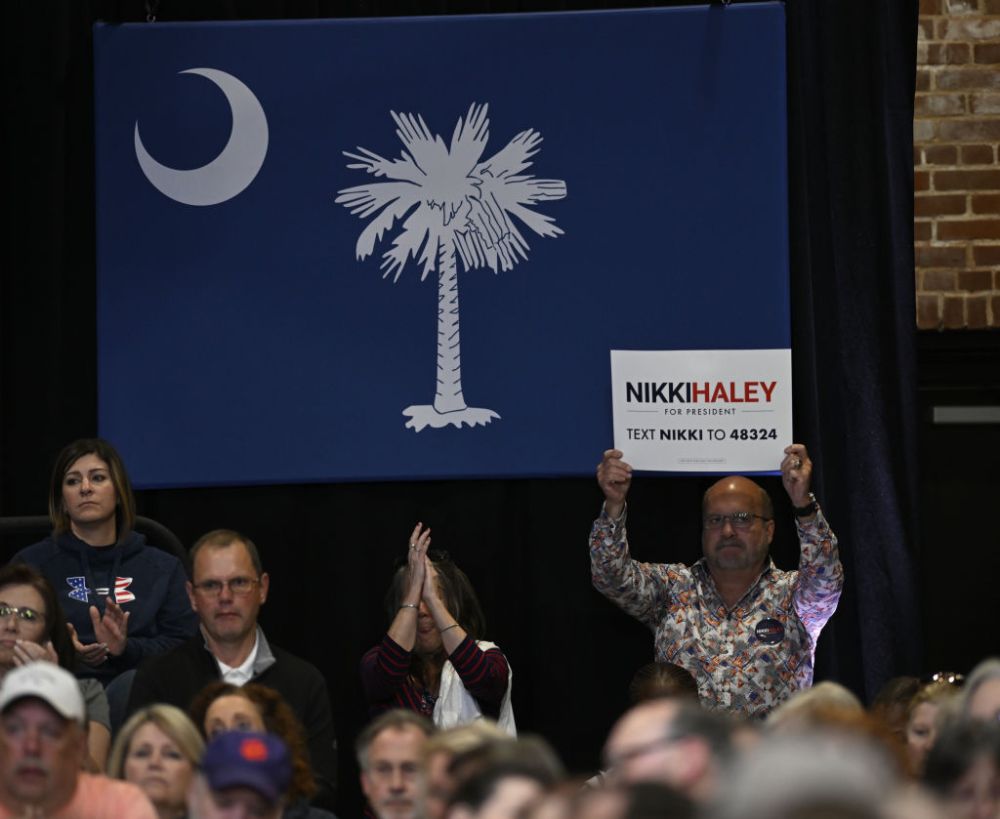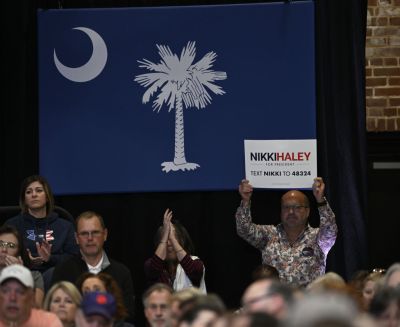Happy Wednesday! We’re excited to announce The Dispatch is expanding into brick-and-mortar retail! We hope you look forward to “Rigged and Stollen,” our forthcoming combination bait shop and German bakery.
Up to Speed
- On Tuesday morning, House Majority Whip Tom Emmer emerged from a crowded field to become the latest Republican nominated by his conference for speaker of the House. The Minnesotan defeated the runner-up, Rep. Mike Johnson of Louisiana, 117-97 on the fifth ballot of the day. Emmer bowed out four hours later, chased from the race first by opposition from staunch conservatives like Rep. Jim Banks of Indiana who said they would oppose the majority whip on the House floor—and then by an unexpected knifing from former President Donald Trump. Just 24 hours earlier, Trump had said he was staying out of the speaker race. But after Emmer’s ascension was imperiled by resistance from Republican members, Trump unloaded on him on social media as “totally out of touch” and a “globalist RINO.” Reconvening Tuesday evening for another few rounds of voting, a fatigued House Republican conference settled on Johnson. A floor vote is expected Wednesday.
- Acting in consultation with Gov. Ron DeSantis, Florida’s state university system moved Tuesday to ban the organization Students for Justice in Palestine on its campuses, arguing that the group’s public statements—which included calling Hamas’ attack on Israel “a historic win for the Palestinian resistance”—amounted to “support of terrorism.”
- A third lawyer involved in Donald Trump’s efforts to steal the 2020 election has now admitted to a felony related to those efforts in Georgia. Attorney Jenna Ellis pleaded guilty on Tuesday to one charge of aiding and abetting false statements and writings and has agreed to cooperate with prosecutors. As she entered her plea, Ellis argued that the real blame fell on the team’s more senior lawyers, whose false claims she had failed to thoroughly vet. “If I knew then what I know now, I would have declined to represent Donald Trump in these post-election challenges,” Ellis said.
- Nikki Haley on Tuesday criticized Donald Trump for apparently refusing to pay local law enforcement in New Hampshire for providing security at his campaign events in the state, saying the former president should “fund the police.” According to Raw Story, the Trump campaign owes agencies in Concord and Manchester $3,788 and $12,870, respectively. “It’s ridiculous to stiff law enforcement and ultimately stick taxpayers with the bill,” Haley campaign spokesman Ken Farnaso said in a statement. “Nikki Haley wants to make sure police and their families are paid. Apparently, Donald Trump doesn’t care.” According to the RealClearPolitics polling average, Trump currently leads Haley in New Hampshire 45 percent to 14 percent.
- Vivek Ramaswamy’s campaign confirmed in a brief email exchange with The Dispatch that the Republican contender is undecided about participating in his party’s next televised presidential debate, scheduled for November 8 in Miami. “Still TBD,” Ramaswamy campaign spokeswoman Tricia McLaughlin said this week.
South Carolina Primary Sidelined
South Carolina Republicans like to think they pick presidents, or at least GOP presidential nominees. Since 1980, the winner of the Palmetto State’s Republican presidential primary has captured the nomination in every open race but one: 2012. But this year, the state’s contest may become an afterthought.
Former President Donald Trump’s healthy polling lead—both nationally and in South Carolina—may be one reason why.
“President Trump remains a strong favorite in South Carolina,” Rob Godfrey, a Republican strategist in South Carolina who is neutral in the primary, told The Dispatch. “He has consolidated support among insiders and outsiders, when it comes to the party apparatus, and every candidate has their work cut out for them to dislodge supporters from him.”
“Trump does cast a very long shadow over the Republican race right now,” added Dave Wilson, another neutral conservative strategist in the state. “Right now, because he has a sizable lead, people can’t see past that.”
South Carolina has still been hosting its fair share of prominent Republican contenders, befitting a traditional, key early primary state. Trump has visited, Florida Gov. Ron DeSantis was in-state last week, and even former New Jersey Gov. Chris Christie, who has been campaigning primarily in New Hampshire, hosted a town hall in South Carolina in recent days. But party insiders there concede the February 24 primary lacks the drama and anticipation that usually accompanies the first GOP contest in the South.
And it’s not just because of Trump and the big lead his competitors can’t seem to cut into.
Among the Republicans seeking the nomination are two prominent South Carolinians: Sen. Tim Scott and Nikki Haley, a former governor and former U.S. ambassador to the United Nations. Because these two theoretical hometown favorites are presidential contenders, some Republican insiders question whether South Carolina will be competitive for other candidates after the Iowa caucus and New Hampshire primary.
That’s if either Haley, Scott, or both can find a way to make this primary more competitive and put themselves in a position to win by the time South Carolina votes, just ahead of the several “super Tuesday” primaries that follow. Drew McKissick, chairman of the South Carolina Republican Party, believes it’s far too early to conclude the 2024 primary is nothing more than a Trump formality.
“South Carolina has the best record for picking the nominee; we’ve only missed one time,” McKissick said Wednesday in a telephone interview. “I expect we’ll have 10 candidates on the ballot before filing is done.”
The deadline to file candidate papers for the South Carolina primary is 5 p.m. on October 31.
Both the Scott and Haley campaigns declined to comment for this story. But political supporters of both South Carolina Republicans are hoping their home-state primary provides an advantage over the competition.
Scott’s camp points to the fact that the senator won reelection with 63 percent just last year, evidence that Republican voters like him. But it’s Haley, who appointed Scott to fill a vacant Senate seat when she was governor, who has the momentum. Scott just announced a new Iowa-or-bust strategy to save his flagging campaign; Haley has been moving up in the polls and is making a play to become the consensus alternative to Trump.
Still, the former governor trails her old boss in the RealClearPolitics average 47.8 percent to 15.3 percent in South Carolina. Scott is in fourth, behind DeSantis, at 9.8 percent.
House GOP Settles on McCarthy Scalise Jordan Emmer Johnson for Speaker
The House GOP is cycling through speaker candidates faster than we can write about them. Since we last published this newsletter on Monday, Republican members of Congress have held two successive elections to decide on their designate for speaker. Still, the House of Representatives is perhaps closing in on getting a new presiding officer: the relatively unknown Rep. Mike Johnson of Louisiana.
But first, it was Rep. Tom Emmer of Minnesota’s turn in the hot seat. Around noon on Tuesday, after multiple rounds of balloting, the House Republican conference elected Emmer as its designee, with the Minnesotan edging out Johnson by 20 votes. It was hardly a resounding victory, and it looked eerily similar to Majority Leader Steve Scalise’s close win just two weeks ago. Scalise quickly learned a significant number of Republicans would not support him on the floor.
Sure enough, Emmer’s bid for the speakership was over before it began. The Republican whip and the former head of the House GOP’s campaign arm found himself cast as an establishmentarian and Never Trumper, despite his efforts to patch things up with Donald Trump himself in a pre-election phone call to the former president over the weekend.
Emmer never had the votes, but a mid-afternoon post on Truth Social from Trump seemed to seal his fate.
“I have many wonderful friends wanting to be Speaker of the House, and some are truly great Warriors. RINO Tom Emmer, who I do not know well, is not one of them,” Trump wrote. “Voting for a Globalist RINO like Tom Emmer would be a tragic mistake!”
A couple hours later, Emmer dropped out, and by Tuesday evening the conference had coalesced around Johnson. The preference of many hardline members, Johnson had the pro-Trump bona fides to pass that particular litmus test, though by this point practically every Republican willing to throw their hat in the ring was “100 percent trump.” (In other words, every single candidate voted against certifying the 2020 election.)
Tuesday night’s in-conference vote didn’t immediately suggest House Republicans are ready to unify. Johnson won the race with 128 votes, followed by 44 votes for “other”—though most reporting suggests all but one of those final votes were for former House Speaker Kevin McCarthy. In addition, 29 votes went to Rep. Byron Donalds of Florida.
But a late-night press conference on Tuesday gave the appearance of Republicans coming together. Johnson was surrounded by members from the conference’s various factions—including moderates like Rep. Mario Diaz-Balart of Florida, Freedom Caucus stalwarts like Rep. Lauren Boebert of Colorado, and members of House leadership like Scalise and Rep. Elise Stefanik of New York. What was just as telling, however, was when one reporter attempted to ask a question about Johnson’s leading role in House Republicans’ efforts to object to the results of the 2020 election. Johnson and the crowd of Republicans around him booed and shook their heads. Rep. Virginia Foxx of North Carolina even told the reporter to “shut up, shut up!”
A full House vote on the new speaker designate is scheduled to occur after the House reconvenes at noon on Wednesday.
Notable and Quotable
“I don’t think we’ve hit rock bottom yet.”—Rep. Max Miller, Republican from Ohio, October 24, 2023








Please note that we at The Dispatch hold ourselves, our work, and our commenters to a higher standard than other places on the internet. We welcome comments that foster genuine debate or discussion—including comments critical of us or our work—but responses that include ad hominem attacks on fellow Dispatch members or are intended to stoke fear and anger may be moderated.
With your membership, you only have the ability to comment on The Morning Dispatch articles. Consider upgrading to join the conversation everywhere.